Naturally, most of us would love a free piano — especially if it was a free baby grand piano. However, great free pianos are rare finds. And on the other hand, this free piano scam is becoming quite widespread.
If it sounds too good to be true, it probably is.
That’s a lesson most of us have had to learn, and hopefully you haven’t had to learn it the hard way.
In case you need a reminder, please do heed this warning. There are some pretty convincing scams for free pianos going around. . . .
We’ve talked about why you shouldn’t get a “free piano” before. There are cases where a real person is willing to donate their piano as long as you can cover the $300+ move. It’s a risk we don’t advise most people take — but we don’t think they’re inherently scams.
How Does a Free Piano Scam Work?
Most times, a scammer is claiming to be giving away a free baby grand piano. More often than not, they’ll be Yamaha, Steinway or Kawai pianos. Basically, they’ll be valuable pianos that many would want.
They’ll send pictures and information about the piano that may seem pretty legitimate. Some will even have sophisticated setups and tactics such as fake websites, social media ads, and phone calls to make their offers seem really legitimate.
Of course, the thing is they don’t have the piano to begin with, they only have nice pictures that they copied from legitimate listings.
The telltale sign that this is the case is that they’ll claim they’re out of state, and that you can’t see the piano yourself because the piano is in transit. They’ll ask you to contact the movers and make arrangements with them.
Then, when you call these “movers” (a buddy of the scammer), they’ll ask you where you live. They’ll then say that they’re moving from Point A to Point B (which are in the same region that you’re in) and say that the cost for re-routing their truck and having their guys setup the piano in your home is about $1,000. Which is an expensive move, but very cheap for the piano they’re trying to “give away.”
So you pay the $1000 fee to have the trucks re-routed to your home, but that’s the last you’ll ever hear of the movers or the original donor. They have your money and they’re moving on, while you’re out $1,000 and have no piano.
These scams often target people who aren’t familiar with the piano industry, and who won’t be able to recognize fraudulent schemes. Therefore, it’s crucial to spot the red flags to avoid being their next victim.
What Does this Baby Grand Scam Look Like?
Piano scams aren’t new, but even Alice, Family Piano’s founder, was surprised by how convincing they’ve been looking recently.
Drew, another employee, also received at least 6 from a similar email address over the course of a month. They all went straight to spam initially, but upon opening them, they looked exactly like the email Alice had received.
Indeed, it isn’t usual for scammers to attach a face, but it does help convince you it could be legitimate. While people don’t tend to say they’re “infringing on your privacy” simply by sending you an email, the rest of the email isn’t too phishy. And it doesn’t help that we get tons of requests from people who are actually trying to sell/donate their piano!
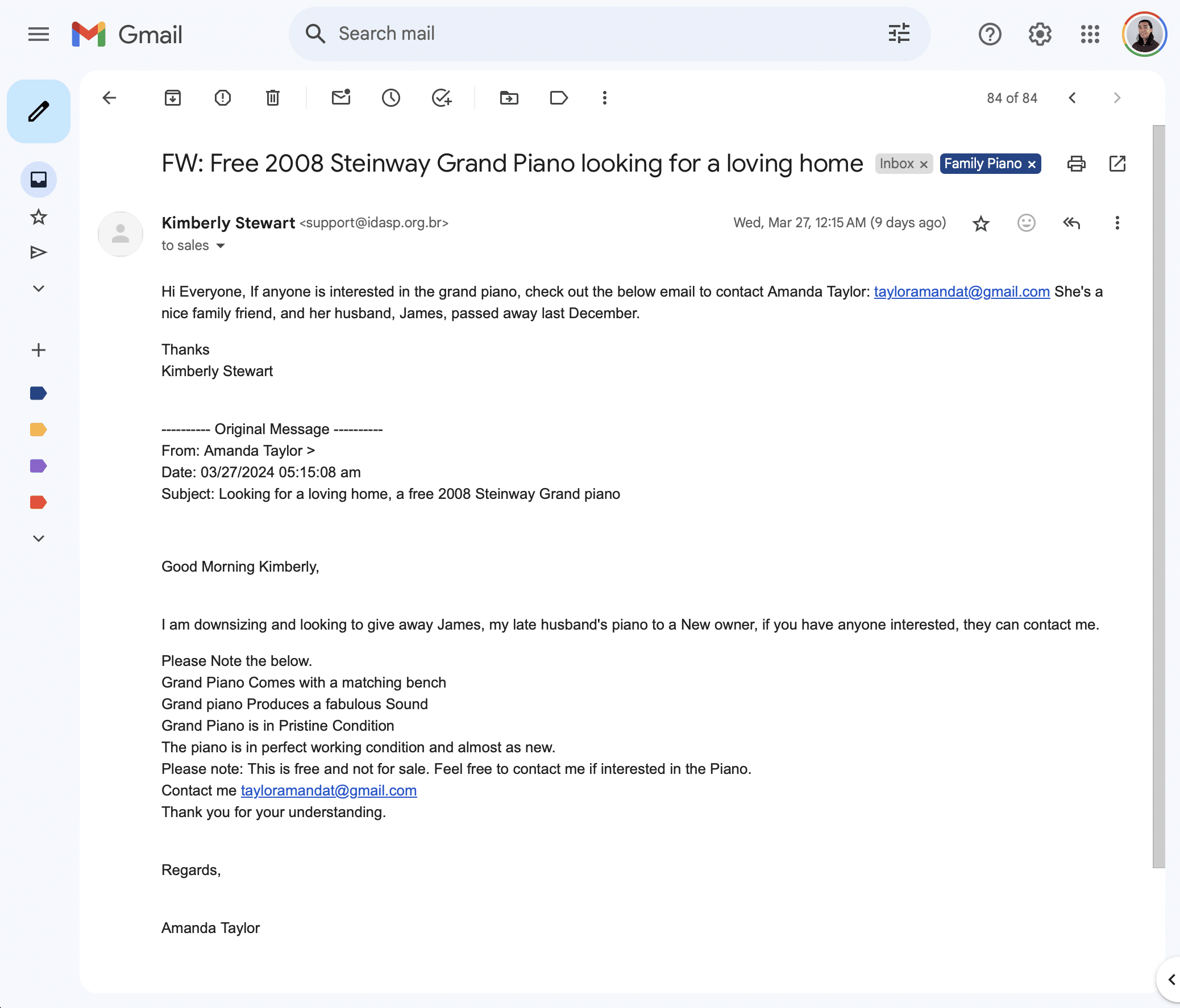
Here's a new scam email we started getting in March 2024. It's meant to look like Kimberly Stewart and Amanda Taylor are good friends in person, one suffering the loss of her husband. Obviously neither are real people — nor is the 2008 Steinway Grand piano!
Do consider that you could have this email forwarded from a trusted friend or family member who believes the email to be legit. They may think it’s an incredible deal but since they don’t have room for it, they’ll forward it to a piano-loving associates. Then, because it’s “coming from” a trusted person, the new recipient is more likely to believe it.
So don’t forward anything you even suspect could be a free piano scam! And if someone forwards it to you, send them this article!
Think You’re Being Scammed?
Simply stop replying if you think you’re talking to a scammer. You have to cut your losses as soon as you can, regardless of if you’ve already sent over personal information or money.
If you’re here and discovering you were about to be scammed, you are one of the lucky ones!
Unfortunately, there are others who have already fallen victim or been close. . . .
The latest almost-victim was a favorite music professor retired from ________ with a music doctorate (brilliant man!) who is still very active in the music community – leader of ________ etc – who was already to send the money “for the move” on a Steinway grand someone would donate to the ________ to sell and make their budget – when a friend STOPPED HIM. . . .
This scam has been going on increasingly for 3 years at least. I’ve known a LOT of others – including piano teachers who should know better but are all ready to pay when they call [us] – often to find out how much it’ll cost to refurbish or do “some work [on the scam piano]” . . .—Alice Alviani, founder of Family Piano
This almost-victim’s Reddit post has one of the more detailed accounts of the scam. The scammers made up a fake website and invoice but had sketchy payment methods!
If you have been scammed: we’re sorry. But again, it is important to cut losses. Scammers are going to try to squeeze as much money out of you as they can!
We had someone recently tell us their piano was “withheld because it didn’t have insurance.” They were then prompted to send over a “refundable deposit” so they could complete delivery — resulting in them losing even more money.
How to Avoid All Piano Scams
Especially if you’re in the market for a piano, protecting yourself from scammers is crucial.
Here are some tips so you can avoid any potential free piano scam:
1. No one gives away outrageously valuable pianos. Scammers will sometimes claim they’re doctors trying to find a loving home for their 2014 Steinway or a big Yamaha grand. While there are occasionally nicer pianos that are given away, 99% of the time they’re not given away to strangers. It’s overall very rare to find a super valuable instrument for free.
2. A lack of logistics and contact information is sketchy. No specifics of what town the piano is in, a date the piano must be moved by, why it must be given away, nothing? Most of the time when people want to give us a piano that’s worth taking in, they give a ton of info. Moreover, no phone number can be shady too. 99% of the time, real people would prefer to just hash this out over the phone.
3. Using copypasta that’s already been reported on on the Internet. Scammers aren’t creative: they copy and paste their emails, and send them to hundreds of people. If you’re getting the same email multiple times, it’s probably a scam. Moreover, Reddit and Piano Forum will sometimes have posts from users who’ve received the same scam emails. And they also use weird spam phrasing like “so sorry to infringe on your privacy.” Try to Google strange text from the phishy email, and it may very well come up.
4. Avoid pianos out of the local area. Most times scammers won’t state this information up front. So if you’re not sure, you can entertain the scammer and ask. If it’s out of the area, there’s a 99% probability it’s a scam.
5. Do not send any private seller money for a move. If someone wants you to coordinate with their mover to deliver the piano to you, then it’s 1000% definitely a scam. In private sales, you can work with any professional piano mover you want directly, and have the mover call the seller to coordinate pickup. It’s standard practice for dealerships, and any legitimate seller won’t mind you do the same.
6. Don’t send any private seller money unless you’ve seen the piano yourself. Buying a piano online can be scary since you haven’t yet seen it. You should feel the same about any piano, even if it’s free. Ideally when working with private sellers, you’re bringing a technician to the deal so they can evaluate the instrument’s quality. No possibility of an evaluation, no deal. Simple as that.
7. Be wary of giving any personal information. Most scammers do want money. However, you should also be careful about giving them sensitive information. Definitely don’t give them a delivery address!
8. Be wary of the payment methods. We recommend only using PayPal Goods & Services if you’re working with a private seller. That way your purchase is protected, and you can easily get your money back in the case it’s a clever scam. Zelle, Venmo, Cash App and even Apple Pay don’t give you the same luxury.
If you think you’ve been scammed already, visit the this article by the FTC on What To Do if You Were Scammed.
Consider Working With Piano Dealers
A piano scam usually preys on a person’s desire to own a nice baby grand piano or other valuable piano.
While we covered an email scam going around now, there are similar schemes pulled on Craigslist and Facebook Marketplace that you should also be cautious of.
Avoid falling for any of them and please remember to follow the tips we shared above. And don’t hesitate to reach out if you’d ever like a second opinion! We’ve thrilled by how many people have told us this article stopped them from being scammed. We’re always happy to help, and we’ll never try to pressure you into buying from us either!
That said, we do encourage anyone piano shopping to consider working with an established piano dealer. By shopping at a store, you get to make an informed and confident decision, you’re guaranteed a high-quality instrument you’ll love, and you avoid all chances of falling for a free piano scam.
In any case, whenever buying a piano, always take the time to research all your options. You’ll often find a free piano isn’t the best piano for you. And in the worst cases, the free piano may not even be a real piano at all.

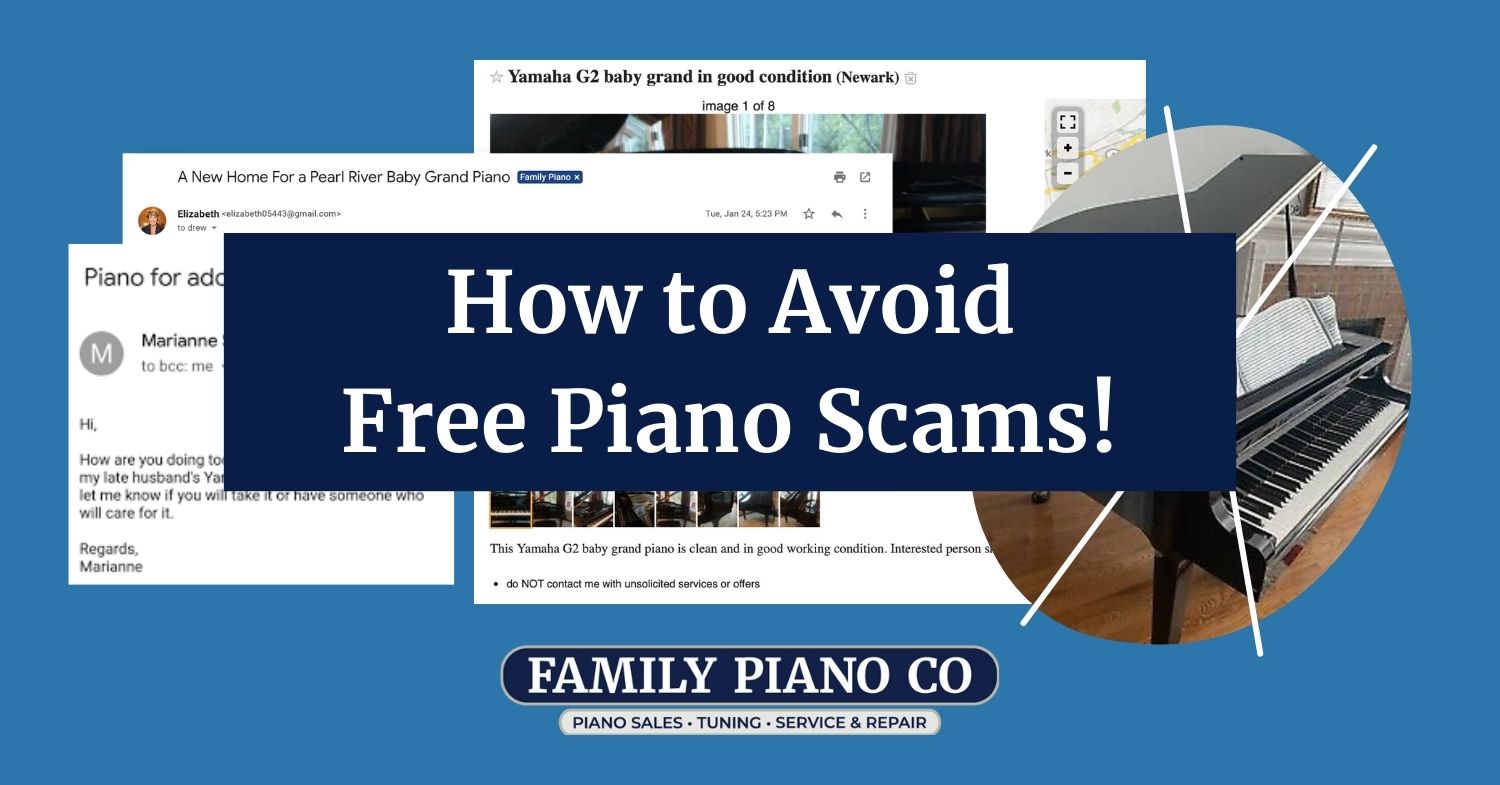
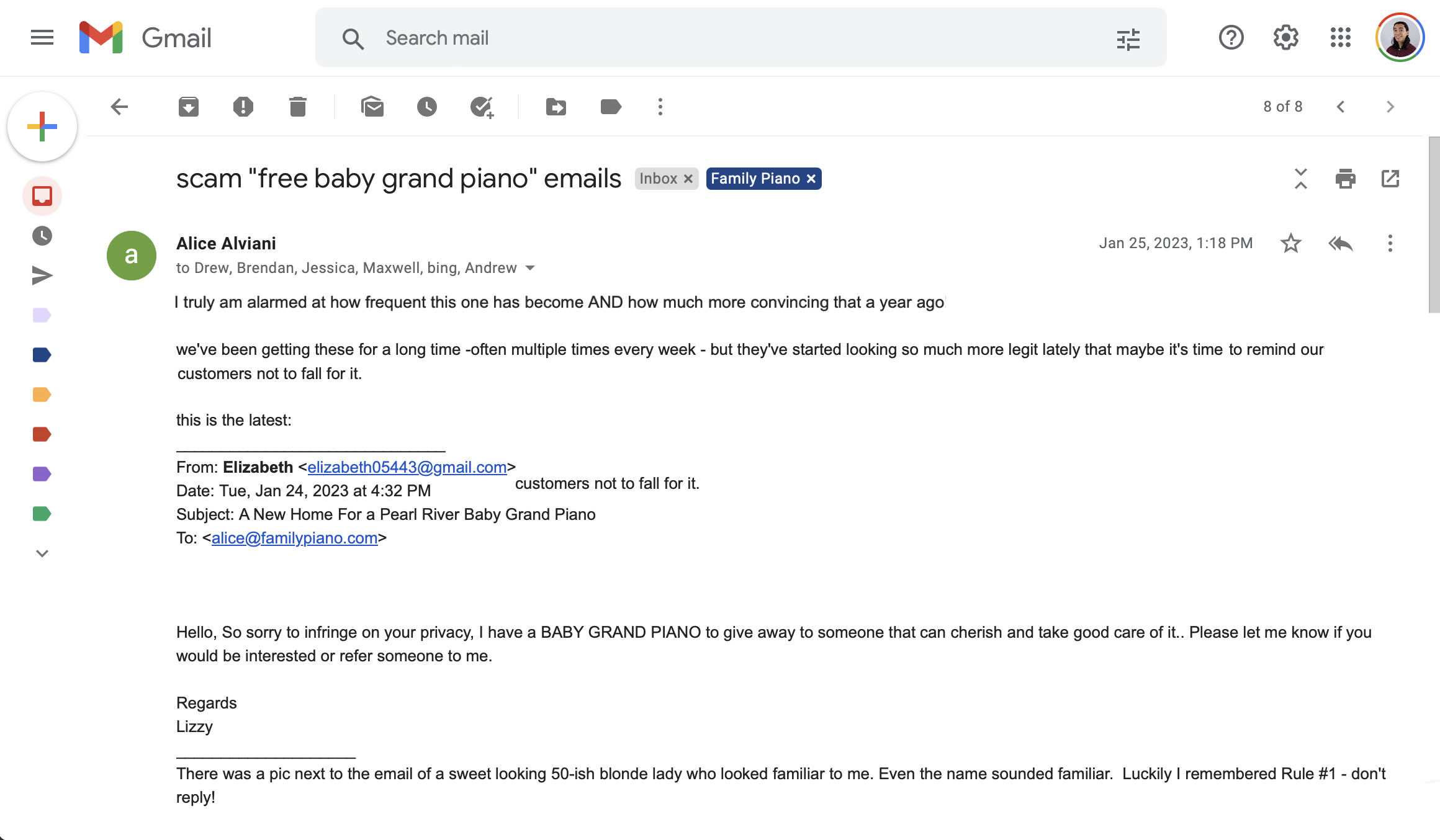
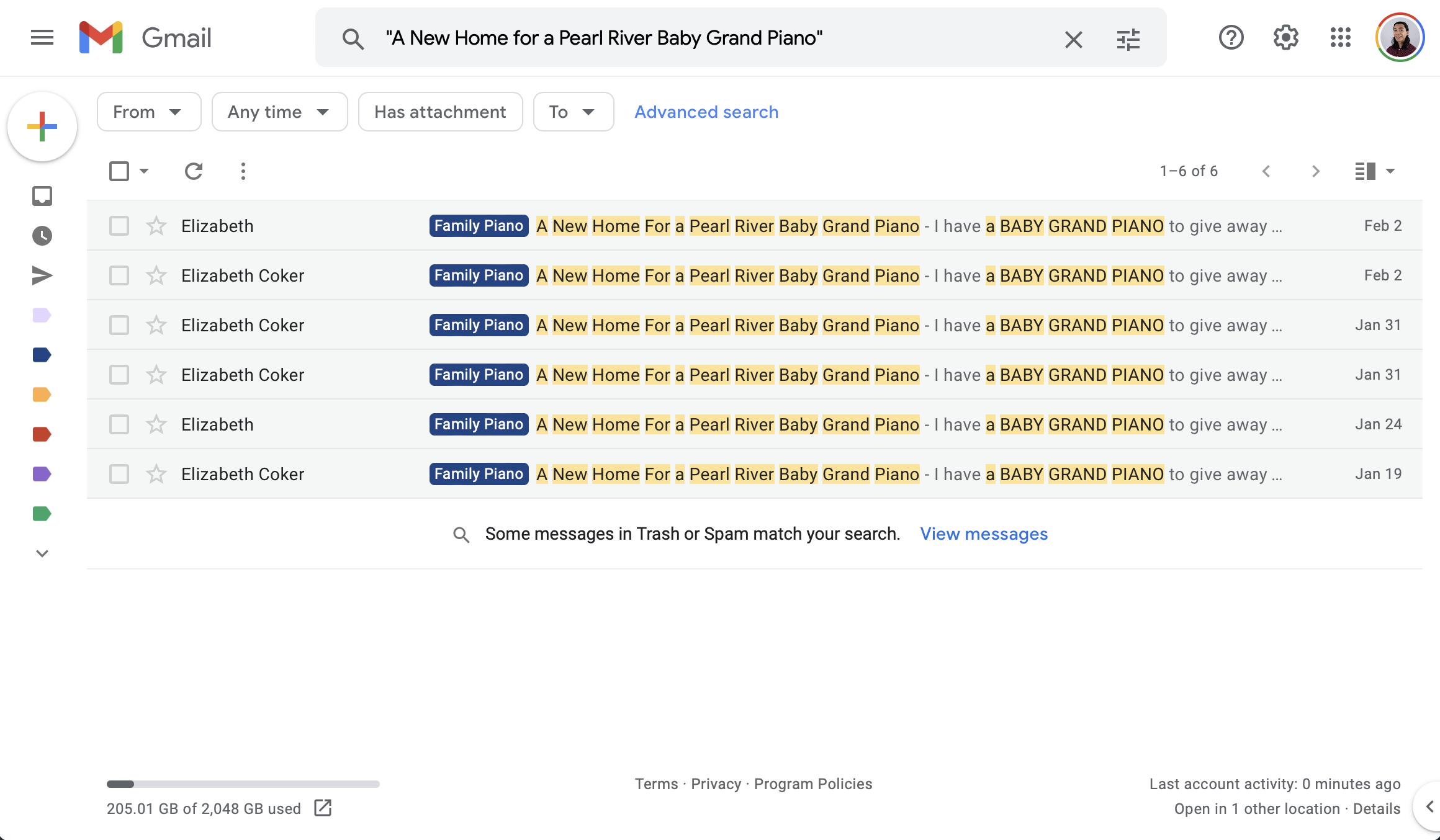
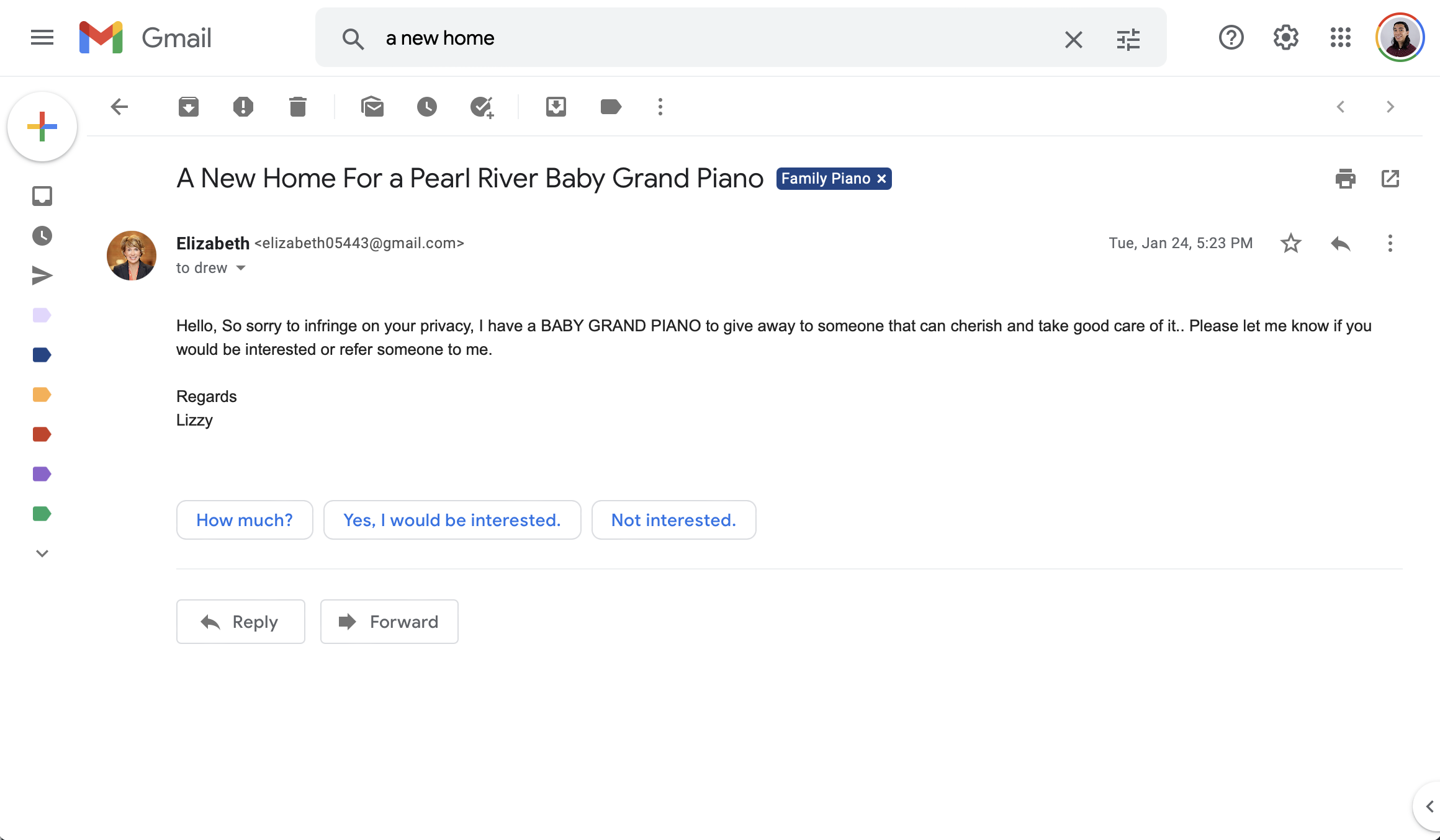
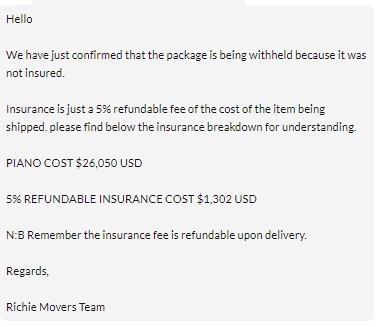
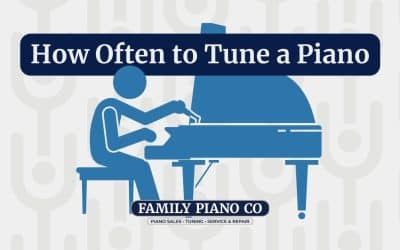
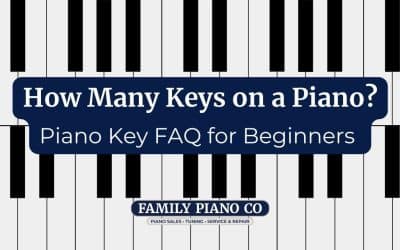

Thank you! I just received one of those “free piano” emails, and figured it had to be a scam. I was curious about the exact nature, so googled “free piano scam” and found your article. Thank you for enlightening me! Bogus moving expenses – I will remember that!
Glad you weren’t had! 😁👍🏼
Thanks Drew! I had the perfect place ready for this piano! Too bad.
This scam came past me this morning. It was from “Charlotte”
Charlotte Hughes
Attachments
12:54 PM (11 minutes ago)
to me
Hi XXXXX,
Thanks for your response, the Yamaha Baby Grand Piano GC1 model used to be owned and played by my husband who passed away last year, the dimension is “151cm by 146cm”. It was last tuned sometime last year before he passed. She’s about 2 years old and in impeccable condition.
I’m moving my properties to another place and I don’t think my husband will be happy if I sell this piano, at the same time, I am settling for a home with less space, so I’m hoping to give it out to someone who is a passionate lover of the instrument. I wasn’t going to leave it alone in an empty house.
The Piano is currently in storage with the movers I employed to move my properties from my house in Frankenmuth, MI. The movers can deliver anywhere. However, the beneficiary has to pay moving costs. In the attachment are the pictures of the Piano, I look forward to your reply if you are interested, if not I can contact someone else.
Yup, that’s exactly the formula. Glad you found this article before you sent any money over. Thanks for sharing, Greg! (:
OMGosh, that sounds almost exactly like the scam I nearly fell for! Glad I Googled and found this website before I send the “movers” the $620 for delivery. I thought it was weird that they didn’t want to know the dimensions of my entrance to make sure the piano would fit through… too bad I gave them my address already, but what are they going to do?
Too many scams going on, thanks for the alert!
KC
Here’s the email I just received:
Hello,
I hope this message finds you well. Susan Peterson gave me your contact details when I told her I am willing to give out a piano for adoption.
I am a widower whose wife had passion for music but never went pro. I have a Kawai Rx2 Piano belonging to my late wife for adoption.
No one near me has a room for the piano at this time. Let me know if you would like to have the piano or know anyone who would appreciate the instrument.
I look forward to hearing from you.
Ramsey.
—-
For the record, I don’t know who “Susan Peterson” is …
It’s always a widow with a nice Yamaha or Kawai!
Thanks for sharing, and happy you didn’t fall for it!
The same “Susan Peterson” email [text exactly as reprinted by Rebecca above] has floated through my inbox several times over the last few months and been ignored. I expect most piano teachers are particular targets. Just this morning, good old “Ramsey Shaw” and “Susan Peterson” were at it again and I received 2 different copies of it within 5 minutes. Wouldn’t it be nice to get a free Kawai RX2 that someone is so anxious to give away? LOL.
Thanks for posting your warning, Drew! I was suspicious enough to Google it rather than replying… although my first question would have been “Where is the piano located?” followed by a big NO if out of state. (And no, I don’t know a Susan Peterson either, but her name makes a great search term to get here!). So now I know the set up of the scam and can help other local piano teachers to not fall for it!
Hey, that’s great, Kathryn! Keep spreading the message! I’m sure they change their names too often to mention, but these comments will definitely be reassuring to the next person. (: Thanks for the comment!
I just received such an email today. The scammer claimed it was her late husband’s cherished Yamaha that was just recently tuned. Pictures and measurements were sent. The only expense would be for shipping, just like you warn people of. The scammer claimed that the piano is currently in storage, and she must part with it due to downsizing her living space. Luckily, a friend informed me that this was a scam before I forwarded the message to too many people. Scammers will always come up with something new!
Just received the exact same e-mail from Sandra Laing. I am situated in Johannesburg, South Africa. No location was given for the piano, but I was told to make contact with the moving company! Thank goodness for this article, otherwise I also would have fallen victim!
I received such an e-mail today, as below:
______________________________________________________
From: Maria Barnard
Sent: 24 May 2024 09:59
To:
Subject: Yamaha baby grand piano
Hi,
I would like to give away my late husband’s Yamaha baby grand piano to a passionate instrument lover. Please let me know if you will take it or have someone who will care for it.
Maria.
_____________________________________________
It was sent from this address: [email protected].
Thanks for the heads up, everyone!
I followed up on a email that had been forward to me, but got out before sending any money. It was fairly sophisticated, communicated with the seller via text and the mover via email, but it was pretty obvious when they only would take cash equivalents as payment that it was a scam. I gave them several chances to authenticate themselves, e.g. asking for a website, to which they replied usps.gov!
Here’s the email exchanges for the record. There are text exchanges as well with the “dad” that I’m not including.
From: Patty Mathison
Subject: Piano Giveaway
Date: February 23, 2024 at 2:13:10 PM EST
To: [UNH Faculty and staff]
Some people who received this message don’t often get email from [email protected]. Learn why this is important
CAUTION: This email originated from outside of the University System. Do not click links or open attachments unless you recognize the sender and know the content is safe.
Dear Faculty/Staff,
One of our staff Mr. Riley is downsizing his late son’s piano to a loving home, the piano is a 2014 Yamaha baby grand used like new. You can text Mr. Riley on (901) 310-2027 to indicate your interest to arrange an inspection and delivery with the moving company.
[texts need to be looked up]
From: me
Dear MMovers07:
My name is —; I live at — (which comes up as — on GPS). Mr Riley very has kindly offered me the Yamaha piano, reference number ABTC31. I have cc’d him on this email.
I would like the piano delivered to my studio under construction at the premises. You may drive right up to the porch about 2 or 3 feet above ground level. It’s a short move, just inside the garage-door sized entrance.
Please let me know if this is possible and what date you would like to deliver it. You may contact me here, or call or text —. Thank you very much.
Very respectfully,
On Saturday, March 2, 2024, ME Movers wrote:
Your mailing address has been received, hold while we calculate the moving cost.
On Saturday, March 2, 2024, ME Movers wrote:
Thank you for your interest in using our service., Welcome to ME Movers, We’re excited to have you on board. My name is Roberto Powell and I’ll be your on-board.
From: ME Movers
Date: Mar 1, 2024, 7:13 PM
to me, [email protected]
COST OF DELIVERY
OPTION 1. GROUND SHIPPING : 10 Days delivery
Cost of delivery
Mailing: $450.00
OPTION 2. CARGO SHIPPING : 5 Days delivery
(2/4)Cost of delivery
Mailing: $555.00
OPTION 3. FREIGHT SHIPPING : 2 Days delivery
Cost of delivery
Mailing: $800.00
NOTE
A Proforma invoice will be emailed to you once you signify your option and readiness to proceed.
On Saturday, March 2, 2024, Dean wrote:
Thank you for your prompt response. I am in no particular hurry as the studio is under construction so the later the better. Are there any disadvantages to the less expensive methods besides the longer delivery time? If the answer is no, I am ready to proceed with ground shipping.
Very best,
From: ME Movers
Date: Mar 1, 2024, 7:20 PM
to me, [email protected]
There’s are no disadvantages it’s just time difference. Signify the option you would like to use so we can provide you the information to make payment and once payment is confirmed you will be email a proforma invoice with a TRACKING NUMBER thank you.
These are the options
Zelle
Venmo
PayPal
Cashapp.
From: me
Date: Mar 1, 2024, 7:42 PM
to ME, [email protected]
Ground shipping, please.
From: ME Movers
Date: Mar 1, 2024, 7:51 PM
to me, [email protected]
Signify the option you would like to use so we can provide you the information to make payment and once payment is confirmed you will be email a proforma invoice with a TRACKING NUMBER thank you.
These are the options
Zelle
Venmo
PayPal
Cashapp.
From: me
Date: Mar 1, 2024, 9:36 PM
to ME, [email protected]
I don’t know either of you really so I’m not comfortable sending cash. How about a credit card?
From: ME Movers
Fri, Mar 1, 9:44 PM
to me, [email protected]
Those are the payment options accepted.
From: me
Mar 1, 2024, 9:46 PM
to ME, [email protected]
Do you have a website or any identity beyond an email address?
From: ME Movers
Date: Mar 1, 2024, 9:48 PM
This is an email service link with usps.com your piano is being processed through usps.gov. ME Movers act as the carrier delivering your package.
From: me
Date: Mar 1, 2024, 9:50 PM
to ME, [email protected]
I’m sorry; I can’t send cash. Happy to agree to COD.
Thank you for your time.
From: ME Movers
Date: Mar 2, 2024, 3:02 AM
to me, [email protected]
Alright sorry for the inconvenience those are the acceptable options thank you.
From: me
Date:Mar 2, 2024, 8:03 AM
to ME, [email protected]
Good luck in prison.
Thanks for the awareness just got the same scam. when I told them that Ihave a friend with a moving company to pick it up, they explained me that upon the terms and conditions of their movers, they are the one that need to ship it